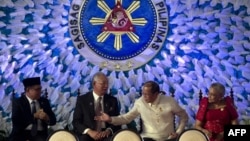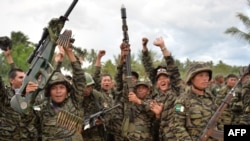MANILA —
The Philippine government and the country’s largest Muslim Rebel group have signed a peace accord to end decades of violence that has left more than 120,000 dead.
More than 1,000 people gathered at Manila's presidential palace Thursday to witness the signing of what is being called a “comprehensive agreement” between lead government negotiators and the Moro Islamic Liberation Front (MILF).
Under the deal, MILF will give up its weapons in exchange for greater political autonomy in the mainly Muslim areas of the southern Mindanao region.
Speaking at the signing ceremony in Manila, President Benigno Aquino hailed the agreement as a "path that can lead to a permanent change in Muslim Mindanao."
"This agreement stands as a testament to how far trust and earnestness can move humanity forward," he said. "It shows how righteousness, reason and goodwill are the mightiest of instruments in ending conflict. It proves that the search for common ground is infinitely more productive than hegemonic ambition."
Aquino also said Mindanao still needs a “significant boost up” in order to catch up with the rest of the country, before issuing stern words to opponents of the deal.
“[To] those who wish to sow divisiveness for self-interest and those who continue to wield arms to pursue their own agendas, so many people have suffered for so long, so many of our stakeholders have worked so hard to arrive at this point: I will not let peace be snatched from my people.”
MILF Chairman Al Haj Murad Ebrahim called the pact a “shared victory” for the entire country, and especially for the “Bangsamoro" residents of the Muslim-majority southern island of Mindanao, to whom he says identity, power and resources have been restored.
“These three things which have been ours since time immemorial, unjustly taken through colonization and occupation, are now returned to us,” he said, describing himself as “overwhelmed with happiness.”
A former top ranking commander with the MILF’s armed forces, Ebrahim also warned of the need to be vigilant as both sides work to carry out the terms of the compact.
Following 17 years of on-and-off negotiations, the newly signed deal, which is the result of talks that began in 2001, still faces a number of obstacles.
For nearly 40 years, Muslim rebel groups have fought for the right to self-determination on Mindanao, historically known as the Autonomous Region in Muslim Mindanao (ARMM), which was formed under a 1996 pact with a smaller rebel group. The current administration has called ARMM, which has the highest poverty rate in the country, a “failed experiment.”
One MILF splinter group, the Bangsamoro Islamic Freedom Fighters, has promised to keep fighting the government until full independence is achieved, and Abu Sayyaf, a militant Islamist group said to have ties to Al-Qaida, also operates in the area.
In Manila, Philippine Congress must also pass a "basic law" to create the political framework for the autonomous region, which will be called Bangsamoro. There will also be significant pressure to approve the deal by the time President Aquino's term in office ends in mid-2016.
While the pact calls for disarming rebels and private armed groups operating in the region, conflict-resolution experts say its success depends on the central government’s ability to deal with smaller factions that are not happy with the agreement.
The country's justice system, experts have said, needs to be strengthened to stop the regular practice of residents settling grievances with arms.
According to Nathan Gilbert Quimpo, an associate professor at Japan's University of Tsukuba, the deal will be more successful than the previous two efforts to achieve peace with Muslim rebels in 1976 and 1996.
"The process that led to the [current] eventual agreement has been more open and participatory," he told VOA. "I think also the two sides have worked out the details much more, for example wealth and power sharing, access, revenues, and those things."
Under the agreement, revenue from the autonomous self-governing region's vast natural resources would be split with Manila, and the region would have its own police force and regional parliament. The central government, however, would oversee citizenship, currency, national defense and postal services.
The Asia Foundation's Steven Rood tells VOA the deal stands to be economically beneficial for all involved.
"[Mindanao] has vast agricultural potential, it has mineral potential, and it has gas and oil potential — all of which has been held back by conflict," he said. "That boost alone will be useful. Of course, making the Philippines more attractive for foreign investment as a whole will also be encouraged by a peace agreement."
Don Emmerson, director of Stanford University's Southeast Asia Forum, tells VOA that while the deal will not immediately end all of the country's rebel conflicts, it will likely help.
"I think it's fair to say of all the various rebel presences in the Philippines, it's this one in the south in Mindanao and the Sulu Archipelago that has been the deadliest and done the greatest damage to the Philippine economy," he said. "So I think if this one can be resolved, the others will become more manageable."
Emmerson cautions that much depends on how much progress is made in implementing the deal by the end of Aquino's term, and how committed his successor is to such a peace deal.
The deal is on a tight timeline, because officials want everything in place in time for the 2016 elections.
A transition committee is drafting a law that would be the basis for forming the Bangsamoro region. The Philippines congress has to approve the measure, which negotiators want passed by the end of this year.
Residents of the proposed area will vote in a referendum next year to determine whether they want to be included in the new entity. Once its borders are defined, they will elect leaders during the 2016 national elections.
VOA's Victor Beattie contributed to this report.
More than 1,000 people gathered at Manila's presidential palace Thursday to witness the signing of what is being called a “comprehensive agreement” between lead government negotiators and the Moro Islamic Liberation Front (MILF).
Under the deal, MILF will give up its weapons in exchange for greater political autonomy in the mainly Muslim areas of the southern Mindanao region.
Speaking at the signing ceremony in Manila, President Benigno Aquino hailed the agreement as a "path that can lead to a permanent change in Muslim Mindanao."
"This agreement stands as a testament to how far trust and earnestness can move humanity forward," he said. "It shows how righteousness, reason and goodwill are the mightiest of instruments in ending conflict. It proves that the search for common ground is infinitely more productive than hegemonic ambition."
Aquino also said Mindanao still needs a “significant boost up” in order to catch up with the rest of the country, before issuing stern words to opponents of the deal.
“[To] those who wish to sow divisiveness for self-interest and those who continue to wield arms to pursue their own agendas, so many people have suffered for so long, so many of our stakeholders have worked so hard to arrive at this point: I will not let peace be snatched from my people.”
MILF Chairman Al Haj Murad Ebrahim called the pact a “shared victory” for the entire country, and especially for the “Bangsamoro" residents of the Muslim-majority southern island of Mindanao, to whom he says identity, power and resources have been restored.
“These three things which have been ours since time immemorial, unjustly taken through colonization and occupation, are now returned to us,” he said, describing himself as “overwhelmed with happiness.”
A former top ranking commander with the MILF’s armed forces, Ebrahim also warned of the need to be vigilant as both sides work to carry out the terms of the compact.
Following 17 years of on-and-off negotiations, the newly signed deal, which is the result of talks that began in 2001, still faces a number of obstacles.
For nearly 40 years, Muslim rebel groups have fought for the right to self-determination on Mindanao, historically known as the Autonomous Region in Muslim Mindanao (ARMM), which was formed under a 1996 pact with a smaller rebel group. The current administration has called ARMM, which has the highest poverty rate in the country, a “failed experiment.”
One MILF splinter group, the Bangsamoro Islamic Freedom Fighters, has promised to keep fighting the government until full independence is achieved, and Abu Sayyaf, a militant Islamist group said to have ties to Al-Qaida, also operates in the area.
In Manila, Philippine Congress must also pass a "basic law" to create the political framework for the autonomous region, which will be called Bangsamoro. There will also be significant pressure to approve the deal by the time President Aquino's term in office ends in mid-2016.
While the pact calls for disarming rebels and private armed groups operating in the region, conflict-resolution experts say its success depends on the central government’s ability to deal with smaller factions that are not happy with the agreement.
The country's justice system, experts have said, needs to be strengthened to stop the regular practice of residents settling grievances with arms.
According to Nathan Gilbert Quimpo, an associate professor at Japan's University of Tsukuba, the deal will be more successful than the previous two efforts to achieve peace with Muslim rebels in 1976 and 1996.
"The process that led to the [current] eventual agreement has been more open and participatory," he told VOA. "I think also the two sides have worked out the details much more, for example wealth and power sharing, access, revenues, and those things."
Under the agreement, revenue from the autonomous self-governing region's vast natural resources would be split with Manila, and the region would have its own police force and regional parliament. The central government, however, would oversee citizenship, currency, national defense and postal services.
The Asia Foundation's Steven Rood tells VOA the deal stands to be economically beneficial for all involved.
"[Mindanao] has vast agricultural potential, it has mineral potential, and it has gas and oil potential — all of which has been held back by conflict," he said. "That boost alone will be useful. Of course, making the Philippines more attractive for foreign investment as a whole will also be encouraged by a peace agreement."
Don Emmerson, director of Stanford University's Southeast Asia Forum, tells VOA that while the deal will not immediately end all of the country's rebel conflicts, it will likely help.
"I think it's fair to say of all the various rebel presences in the Philippines, it's this one in the south in Mindanao and the Sulu Archipelago that has been the deadliest and done the greatest damage to the Philippine economy," he said. "So I think if this one can be resolved, the others will become more manageable."
Emmerson cautions that much depends on how much progress is made in implementing the deal by the end of Aquino's term, and how committed his successor is to such a peace deal.
The deal is on a tight timeline, because officials want everything in place in time for the 2016 elections.
A transition committee is drafting a law that would be the basis for forming the Bangsamoro region. The Philippines congress has to approve the measure, which negotiators want passed by the end of this year.
Residents of the proposed area will vote in a referendum next year to determine whether they want to be included in the new entity. Once its borders are defined, they will elect leaders during the 2016 national elections.
VOA's Victor Beattie contributed to this report.





